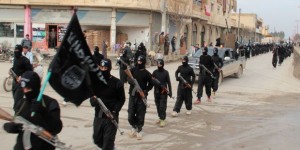 UNITED NATIONS — Like a swirling and malevolent desert sandstorm, an Islamic jihadi terrorist movement is sweeping across northern Iraq. With decisive speed, lightning gains, and sickening brutality the Islamic State of Iraq and the Levant (ISIL) has seized key cities and destabilized an ineffective government in Baghdad.
UNITED NATIONS — Like a swirling and malevolent desert sandstorm, an Islamic jihadi terrorist movement is sweeping across northern Iraq. With decisive speed, lightning gains, and sickening brutality the Islamic State of Iraq and the Levant (ISIL) has seized key cities and destabilized an ineffective government in Baghdad.
Washington has been jarred by these events which portend ill for the survival of the Iraqi state.
UN Secretary General Ban Ki-moon stated forcefully, “Terrorism must not be allowed to succeed in undoing the path towards democracy in Iraq.” The UN Security Council “deplores in the strongest terms “ the widespread attacks against civilians, and the “recent terrorist attacks being perpetrated against the people of Iraq.”

UN sources say over 500,000 civilians, half of them children, have fled Mosul.
The recent flare-up of fighting in Iraq mirrors sectarian rifts within Islam; namely the fragile ethno/political fault-lines between the majority Shi’ite and minority Sunni Muslims. The combustible proximity of the two communities has seen frequent violence. In the month of May alone the UN reports that 800 civilians killed and many more wounded in sectarian violence in the restive province of Anbar. Remember the blood and treasure the USA expended to stabilize bloody Anbar a decade ago?
Many of the problems rest with the map; namely the Anglo/French Sykes-Picot agreement of 1916 which redrew the post Ottoman map with artificial new borders.
During the regime of Saddam Hussein the minority Sunni ruled the country with an iron fist. After Saddam was toppled by an Anglo/American military operation in 2003, the balance shifted allowing the formerly disenfranchised Shi’ites to gain power through the ballot box which in turn soon alienated the Sunni. In other words, democracy came, but with unintended consequences.
The formal pullout of American forces from Iraq in 2011, (forced by a bunch of venal politicians in Baghdad and a strategic myopia of the Obama Administration) reopened this Pandora’s box of ethnic rivalries, which are largely fed by an incompetent Shi’ite-dominated central government, massive corruption, and simmering Sunni resentment.
As importantly the near ambivalence that Washington has shown to developments in Iraq since the U.S. military pullout, has quietly encouraged the rebels morale, emboldened some of the clowns in the Iraqi government, and allowed for a dangerous political vacuum for ISIL (also Islamic State of Iraq and Syria or ISIS) terrorists.
Though the Al Qaida-affiliated ISIS favors a Sunni dominated Islamic caliphate across the Middle East, like the Afghan Taliban its austere political philosophy has little appeal to the majority of Sunni Arabs. Thus brute terror becomes its political calling card. The speed of gains have created a fear factor in which fragile Iraqi institutions and an essentially ineffective army have folded despite an advantage in numbers and material.
ISIS is composed of an internationale of Islamic extremists not only from the Middle East but from Western Europe, Chechens, and even some Americans.
As with their gains in neighboring Syria, fighting both the Damascus dictatorship as well as many of the rebel groups, ISIS has created an aura of political inevitability. Though the northern city of Mosul has fallen and much of the Sunni strongholds of Anbar province has come under the ISIS sway, the group will not likely spread into the Kurdish lands nor the major Shiite population centers in the south. What can happen is a renewed civil war.
Lightning gains by ISIS can face lightning setbacks with focused force as we saw in Mali in 2012 when a similar Islamic Al Qaida affiliate swept across large swaths of the West African state only to be routed by a lethal French counter-attack.
Yet, the Nouri Al-Malaki government in Baghdad refused to allow even a small American residual force to remain in Iraq for precisely this type of contingency and to offer a psychological boost. I’m sure a few battalions of U.S. Marines could decisively defeat the ISIS which are few in numbers. But that option is off the table by Baghdad’s choice. The fulcrum of power could tip against the government.
Glaringly these unfolding events in Iraq portend ill for Afghanistan where a politically-driven pullout of American forces could create a similar situation in a few years. This is exactly why the Obama Administration must negotiate a serious status of forces agreement with the new Kabul government to keep a small but lethal U.S. force on call after 2015. We owe it to the fallen Americans and Afghans who have tried to save that country from the white heat of hatred and extremism.
We owe it to our own security too.
John J. Metzler is a U.N. correspondent covering diplomatic and defense issues. He writes weekly for WorldTribune.com. He is the author of Transatlantic Divide ; USA/Euroland Rift (University Press, 2010).

You must be logged in to post a comment Login